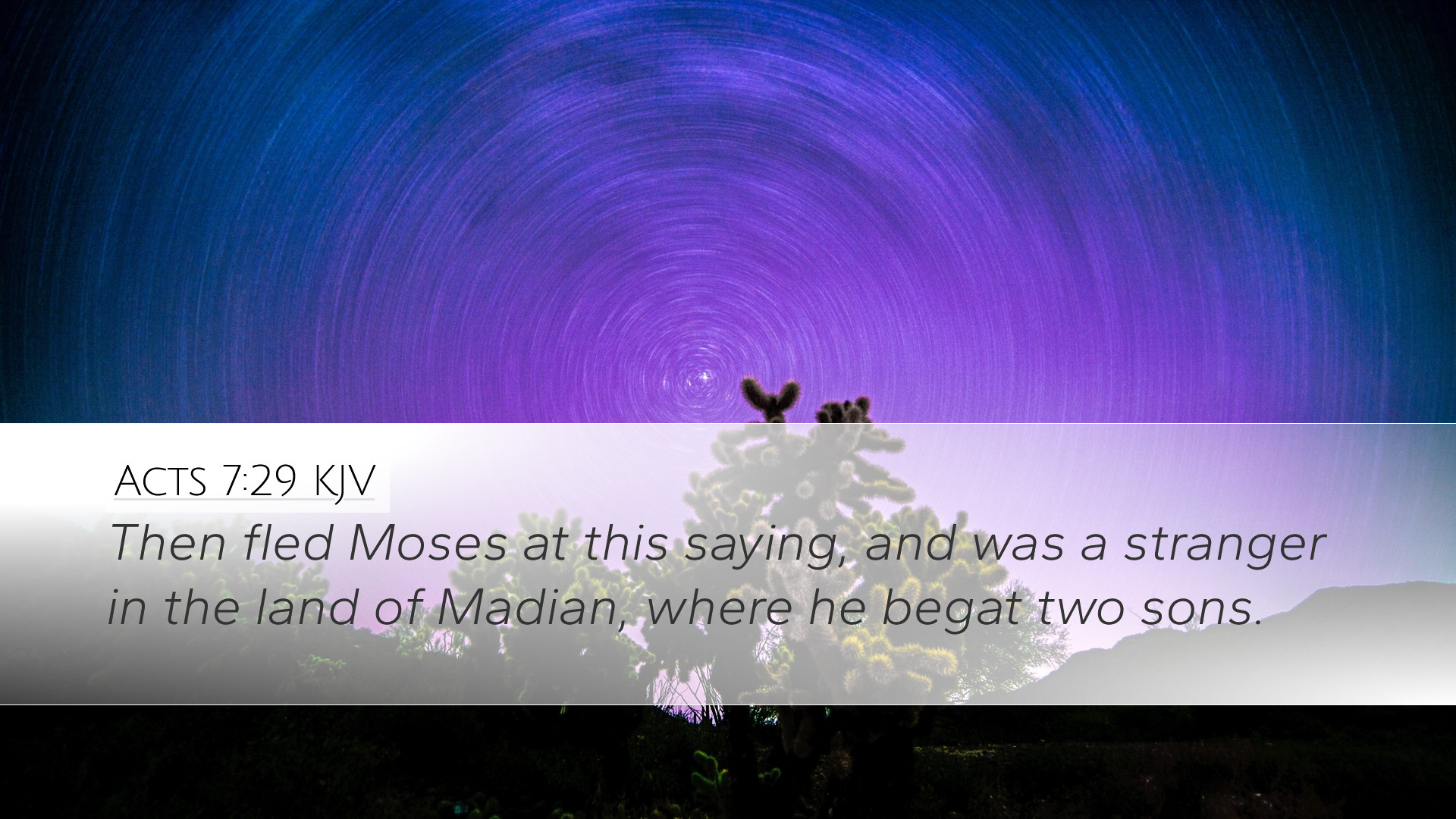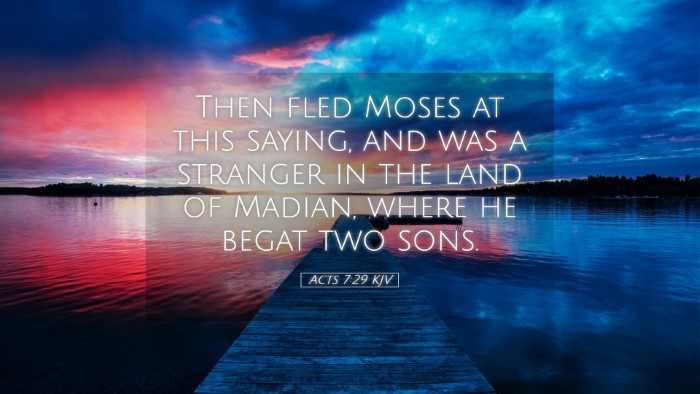Commentary on Acts 7:29
Acts 7:29 states:
"At this saying, Moses fled, and was a stranger in the land of Midian, where he begat two sons."
Contextual Background
This verse lies within Stephen's speech in the New Testament, where he recounts the history of Israel. Stephen highlights pivotal moments in the nation's narrative, ultimately leading towards the significance of Christ and the rejection of God's messengers by His people.
The Role of Moses
Moses is a central figure in Jewish history, revered for leading Israel out of Egypt and receiving the Law on Sinai. However, Acts 7:29 emphasizes a critical turning point in his life: his flight to Midian after killing an Egyptian.
Insights from Commentaries
Matthew Henry's Commentary
Henry notes that Moses' flight was both a response to fear and a culmination of his mistakes. Initially attempting to intervene in the plight of his people, he resorted to violence, which led to his rejection by those he sought to help. Henry writes, "Moses had some spark of a good spirit, and thought that he could deliver Israel by his own strength, but he was not yet prepared for so great a work."
This highlights the human tendency to act impulsively, especially when one desires to champion a noble cause. His escape to Midian symbolizes a period of preparation and humility.
Albert Barnes' Notes
Barnes elaborates on the significance of Moses' sojourn in Midian. He argues that this time apart from Egypt was crucial for Moses' development as a leader. Barnes writes, "Moses was a stranger in the land of Midian," indicating that he had to separate from his former identity to fulfill God's calling. Here, he learned humility, patience, and reliance on God, attributes essential for his later role in leading Israel out of bondage.
Adam Clarke's Commentary
Clarke emphasizes the divine providence in Moses' life, suggesting that this period in Midian was part of God's plan. He points out that while Moses thought he was alone and in exile, God was preparing him for his significant future tasks. Clarke states, "Moses' retreat was not a sign of his failure but a part of God's training process." Furthermore, he notes the birth of Moses' two sons in Midian, which signifies continuity and the unfolding of God's promise even in unforeseen circumstances.
Theological Reflections
The verse prompts significant theological reflection. It reveals God's method of shaping His leaders, often through trials and seasons of obscurity. The shift from Egypt to Midian represents a divine recalibration of Moses' identity; no longer a member of the royal household, he became a shepherd and father, roles that would enrich his character and leadership.
Implications for Leadership
- Preparation Necessity: Just as Moses needed preparation, so too do today's leaders. Periods of solitude and challenge can refine one's capabilities.
- Handling Failure: Moses' initial failure serves as a reminder that setbacks do not disqualify one from future service. Redemption is a theme running throughout Scripture.
- God's Providence: The assurance that God is sovereign even when His people are in exile helps believers trust in His overarching plan.
Practical Applications
For pastors, students, theologians, and scholars, the reflections from Acts 7:29 encourage a deeper understanding of the processes God employs in shaping His servants. It emphasizes a posture of reliance on divine timing and guidance rather than human ingenuity.
Encouragement in Trials
During times of trial or perceived exile, it is crucial to remember that these experiences may be part of God’s plan. As seen in Moses' life, one’s current situation is often preparatory, leading to greater purposes.
Learning from Failure
Similarly, the acknowledgment of human failure should inspire grace and resilience. Reflecting on Moses’ mistakes encourages leaders to embrace vulnerability and dependence on God’s grace.
Conclusion
Acts 7:29 serves as a crucial reminder of God's hand in the preparation of leaders. The flight of Moses into Midian is not merely a historical account but an illustration of God's transformative work in the lives of His chosen servants. Those engaged in pastoral care and theological study can draw from this rich narrative, finding strength and understanding in the sovereignty of God amidst life's wilderness experiences.


